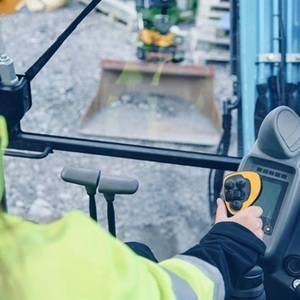Liebherr expands its use of Neste MY Renewable Diesel

SOURCE: Neste
February 1, 2022
BY Neste Corp.
From January 2022 onwards, Liebherr will be expanding its use of Neste MY Renewable Diesel to its plant in Kirchdorf where the company develops and manufactures annually approximately 2,500 machines, such as hydraulic excavators, material handling machines and articulated trucks. Neste-produced renewable diesel will be used in the first fill and testing as well as in all plant traffic.
Liebherr has already been powering its mobile and crawler cranes at its plant in Ehingen exclusively with Neste MY Renewable Diesel since September 2021. Liebherr is a global leader in the manufacture of mobile cranes.
Liebherr has been preparing its entire range of mobile and crawler cranes to use renewable diesel over the past few months. Engine manufacturers have checked, certified and approved the use of renewable diesel in the diesel engines. Customers and the company’s own test department have also conducted extensive tests on the cranes powered by renewable diesel. The required tests for the approval were conducted with Neste MY Renewable Diesel.
“We will be able to save 2.5 million liters of fossil diesel per year by switching to Neste MY Renewable Diesel. That will mean an annual reduction of around 6,500 tons of CO2,” describes Ulrich Heusel, production director at Liebherr-Werk Ehingen GmbH.
Advertisement
Advertisement
Neste MY Renewable Diesel is a more sustainable alternative to fossil diesel. By switching to renewable diesel, diesel-powered machines in the existing fleets around the world can start reducing greenhouse gas emissions in an instant. By using Neste MY Renewable Diesel as a first-fill fuel and by approving its use in all its machines, including also the older machinery, Liebherr can enable its customers to reduce emissions from their operations.
“We are very proud to work with Liebherr. The fact that they also largely approve Neste MY Renewable Diesel usage in older machinery, makes it easy for the construction industry to reduce their climate emissions significantly in an instant,'' says Carl Nyberg, executive vice president, renewable road transportation at Neste. “We are committed to supporting our customers to reduce their greenhouse gas emissions by at least 20 million tons annually by 2030,” Nyberg continues.
Switching to Neste MY Renewable Diesel enables a significant reduction in greenhouse gas emissions
Neste MY Renewable Diesel is produced from 100 percent renewable raw materials. Its helps reduce greenhouse gas (GHG) emissions by up to 90 percent when emissions over the fuel's life cycle are compared with fossil diesel. The renewable diesel is a “drop-in” fuel, fully compatible with all diesel engines, not requiring any modifications to the existing vehicles or fuel distribution infrastructures.
Advertisement
Advertisement
Growing availability of renewable diesel and other renewable products
Neste is the world’s leading producer of renewable diesel. Neste’s Rotterdam refinery together with the company’s Singapore refinery are the world’s biggest and most advanced renewable diesel and renewable products refineries. The total annual production capacity of Neste’s renewable diesel and other renewable products is currently 3.2 million tons, and by the end of the first quarter of 2023 it will increase to 4.5 million tons.
Related Stories
The U.S. Energy Information Administration maintained its forecast for 2025 and 2026 biodiesel, renewable diesel and sustainable aviation fuel (SAF) production in its latest Short-Term Energy Outlook, released July 8.
XCF Global Inc. on July 10 shared its strategic plan to invest close to $1 billion in developing a network of SAF production facilities, expanding its U.S. footprint, and advancing its international growth strategy.
U.S. fuel ethanol capacity fell slightly in April, while biodiesel and renewable diesel capacity held steady, according to data released by the U.S. EIA on June 30. Feedstock consumption was down when compared to the previous month.
XCF Global Inc. on July 8 provided a production update on its flagship New Rise Reno facility, underscoring that the plant has successfully produced SAF, renewable diesel, and renewable naphtha during its initial ramp-up.
The USDA’s Risk Management Agency is implementing multiple changes to the Camelina pilot insurance program for the 2026 and succeeding crop years. The changes will expand coverage options and provide greater flexibility for producers.
Upcoming Events










